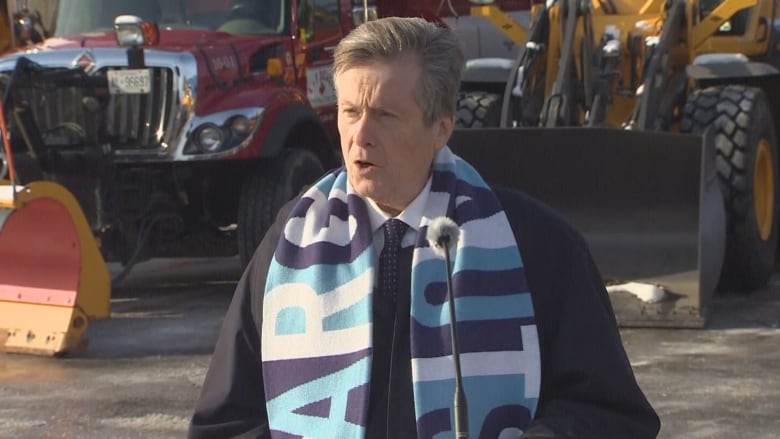New Toronto council meets for first time amid debate over 'strong mayor' powers, housing bill
Contentious provincial policies loom large over 2-day council session

The first day a new Toronto city council meets is normally a time of ceremony and smiles, as new councillors get introduced and statutory business gets done — but when council gets together on Wednesday for the first time since last month's election, it might just be a more tense affair than usual.
Experts say the first two-day session on Wednesday and Thursday will be a fascinating gathering as seven new councillors join the mix and a larger progressive wing arrives at city hall. It will also be the first opportunity for the new council to address a pair of controversial issues — the impact of John Tory's new "strong mayor" powers and the province's sweeping new housing bill.
While Tory's powers aren't explicitly on the meeting agenda, Wayne Petrozzi, a professor of political science at Toronto Metropolitan University, said he expects to see the first signs of pushback from councillors against the mayor.
"I think you'll have a more organized and larger opposition to him on the council," he said. "I think he's in for a tougher term than what he hoped for on his farewell tour."
Tory, who was elected to his third term as mayor last month, has said this will be his last in the role.
Ontario's plan to give the mayors of Toronto and Ottawa additional powers to help speed up construction of new housing has proved controversial. Tory has said he supported the measures, which give him sweeping control over the city budget and hiring and firing of staff.
Last week, the province introduced legislation mandating expanded powers for both mayors, which would allow them to pass bylaws that are deemed provincial priorities by securing the votes of only one third of council..
Tory said he requested the "proactive veto," which has not yet been passed into law, to help ensure more housing is built and so the system will "work as efficiently as possible."

Petrozzi said the new powers, and Tory's request for them, set a poor tone out of the gate between the mayor and councillors.
"Why would you knee-cap your entire council without even having a single meeting with them?" he asked.
"So is that going to rub them, the council members, the wrong way? I think it will. And [Tory's] going to have times where he's going to think 'What the hell did I do?'"
Tory's office said in a statement that his leadership style and overall approach to council won't change.
"[The mayor] has indicated since the introduction of the bill that he expects to make very limited use of this measure," spokesperson Don Peat said.
Council set to debate Bill 23
Council is also set to discuss Ontario's controversial new legislation to spur housing construction, Bill 23. A report from interim City Manager Tracey Cook outlines in stark terms what city staff feel the impact legislation will have on Toronto.
Cook writes that the bill, which has not yet passed, will cut municipal revenues that pay for growth by over $230 million a year. The bill will diminish Toronto's housing affordability and rental replacement protections and erode sustainable development practices, she said.
"The proposed bill could also have the unintended effect of slowing the supply of housing or lower city service levels, such that the city cannot provide new services to support growth," Cook said in the report.

"Alternatively, it could place upward pressure on property taxes."
Tory's office said the mayor is very concerned about the impact the housing bill could have on the city and continues to discuss it with Premier Doug Ford.
"The mayor is continuing to work on this issue every day and hopes a resolution can be found," Peat said.
"But he has also made sure this item is on the agenda for the first meeting of city council ... so every member of council and the public can understand the situation and exactly what is at stake."
Contrasting approaches to spur housing growth
The report highlights the philosophical differences between how the province and city are approaching the housing crisis, said Matti Siemiatycki, a professor of geography and planning at the University of Toronto
"Their working theory is if you add supply, any type of supply, it will trickle down, and it will ultimately lead to more affordability," he said, referring to the Ford government.
"There's really just a fundamental difference in how others are looking at the way that you build a community and also the consequences of that approach as it's borne out through this bill, the fiscal consequences, the consequences on green space and the Greenbelt."
While Siemiatycki says he expects to hear a lot of opposition to the bill at the meeting, councillors will need to come up with alternative policies that are within their control.
"If we just throw sand in the gears, we're going to continue along the same path of the crisis that we're already in," he said.
"This bill could actually galvanize council to have resolve and focus on what the city can do best in order to make sure that we do add supply that is most accommodating of affordability and those who are most vulnerable."

